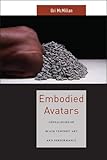Embodied Avatars : Genealogies of Black Feminist Art and Performance / Uri McMillan.
Material type: TextSeries: Sexual Cultures ; 5Publisher: New York, NY : New York University Press, [2015]Copyright date: ©2015Description: 1 online resource : 38 black and white illustrations, 6 Illustrations, colorContent type:
TextSeries: Sexual Cultures ; 5Publisher: New York, NY : New York University Press, [2015]Copyright date: ©2015Description: 1 online resource : 38 black and white illustrations, 6 Illustrations, colorContent type: - 9781479865451
- 704.04208996073 23
- NX512.3.A35 M39 2016
- online - DeGruyter
| Item type | Current library | Call number | URL | Status | Notes | Barcode | |
|---|---|---|---|---|---|---|---|
 eBook
eBook
|
Biblioteca "Angelicum" Pont. Univ. S.Tommaso d'Aquino Nuvola online | online - DeGruyter (Browse shelf(Opens below)) | Online access | Not for loan (Accesso limitato) | Accesso per gli utenti autorizzati / Access for authorized users | (dgr)9781479865451 |
Frontmatter -- Contents -- List of Illustrations -- Acknowledgments -- Introduction: Performing Objects -- 1. Mammy Memory: The Curious Case of Joice Heth, the Ancient Negress -- 2. Passing Performances: Ellen Craft’s Fugitive Selves -- 3. Plastic Possibilities: Adrian Piper’s Adamant Self-Alienation -- 4. Is This Performance about You? The Art, Activism, and Black Feminist Critique of Howardena Pindell -- Conclusion: “I’ve Been Performing My Whole Life” -- Notes -- Index -- About the Author
restricted access online access with authorization star
http://purl.org/coar/access_right/c_16ec
How black women have personified art,expression,identity, and freedom through performanceWinner, 2016 William Sanders Scarborough Prize, presented by the Modern Language Association for an outstanding scholarly study of African American literature or cultureWinner, 2016 Barnard Hewitt Award for Outstanding Research in Theatre History, presented by the American Society for Theatre ResearchWinner, 2016 Errol Hill Award for outstanding scholarship in African American theater, drama, and/or performance studies, presented by the American Society for Theatre ResearchTracing a dynamic genealogy of performance from the nineteenth to the twenty-firstcentury, Uri McMillan contends that black women artists practiced a purposeful self-objectification, transforming themselves into art objects. In doing so, these artists raisednew ways to ponder the intersections of art, performance, and black female embodiment.McMillan reframes the concept of the avatar in the service of black performance art,describing black women performers’ skillful manipulation of synthetic selves and adroitprojection of their performances into other representational mediums. A bold rethinking ofperformance art, Embodied Avatars analyzes daring performances of alterity staged by“ancient negress” Joice Heth and fugitive slave Ellen Craft, seminal artists Adrian Piper andHowardena Pindell, and contemporary visual and music artists Simone Leigh and NickiMinaj. Fusing performance studies with literary analysis and visual culture studies,McMillan offers astute readings of performances staged in theatrical and "idian locales,from freak shows to the streets of 1970s New York; in literary texts, from artists’ writingsto slave narratives; and in visual and digital mediums, including engravings, photography,and video art. Throughout, McMillan reveals how these performers manipulated thedimensions of objecthood, black performance art, and avatars in a powerful re-scripting oftheir bodies while enacting artful forms of social misbehavior.The Critical Lede interview with Uri McMillan
Mode of access: Internet via World Wide Web.
In English.
Description based on online resource; title from PDF title page (publisher's Web site, viewed 06. Mrz 2024)


